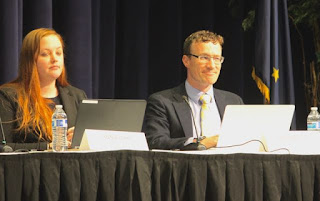UAA, the ADN, and a few others sponsored a debate at UAA's Wendy Williamson Auditorium, Monday evening from 5;30pm to 7pm.
It was a pretty low-key affair with each candidate showing courtesy and significant agreement with each other. My quick crowd estimate (counting people in a few rows and then counting how many rows) gave me a 200-300 estimate.
Current Governor Bill Walker, Independent, was sincere, practical, sounding a bit frustrated that the legislature wouldn't do the responsible thing and create an overall fiscal plan including new revenues. He was critical of the fact that they had used up, I believe he said, 80% of the budget reserves in the last four years.
Former US Senator and Anchorage Mayor Mark Begich, Democrat, had similar themes though he also argued strongly that the Permanent Fund needs Constitutional protections or politicians will use it up. He also called for new revenues.
Libertarian candidate Billy Toien's take was a little different. He pointed to stacks of documents - 30 years of budget data he claimed - and said there is no crisis. He argued that there were various special funds - I think he said about 50 - that should all be put into the general budget and the deficit would go away. Some were mentioned - like the Alaska Aerospace Corporation and the Alaska Railroad. I'm skeptical that moving them all into the general budget would solve our fiscal problems, but it raises the issue of whether these units get considered for cuts during budget time in the same way that regular government agencies do.
Toien, unlike Walker and Begich, was opposed to all new taxes and existing taxes and seemed to believe that the additional revenues generated by putting the independent units' funds into the general budget should be distributed to the people of Alaska.
Republican Mike Dunleavy, we were told, had a conflicting engagement and wasn't there. His presence probably would have added some lively debate. And he was criticized by the other three - they said he was making short term promises with no eye on the future and that all the things he promised - maintaining the permanent fund and current services, plus cutting the budget, and no new revenues - were impossible to achieve.
I thought Begich and Walker treated Toien with the sort of condescending respect one would use for a little kid who participates in an adult activity. But everyone was very cordial.
There were three ADN journalist who were given a chance to ask question.
Tegan Hanlon.
Annie Zak and Tom Hewitt. I wasn't taking notes, but all the questions were pretty routine. Things like, what is on the top of your list of things to cut?
I was waiting for one of the candidates to mention KABATA (the Knik Arm Bridge And Toll Authority), but no one did.
Toien came across to me as the kind of guy who has latched on to a couple of ideas that may, by themselves, have some merit. But that they were utterly untethered from the bigger picture.
Walker is sincere and has 'the adult in the room' sort of tone. He takes his job seriously but it seemed all process - we have to do things reasonably, take the revenues seriously - and little content, and he didn't spell out why he would be more successful with the next legislature than he has been so far.
Begich was able, as he always has been, to talk fluently about facts on all sorts of issues and tie things together. He has the enviable ability to smile and respond with humor to anyone, even those whose ideas he is totally opposed to. I would have like to see how he interacted with Dunleavy.
Dunleavy appears to believe, as do many Alaskans, that he has the election in the bag because Begich and Walker will cut into each others' vote count. So he can just skip forums like this one. If that's true, Alaska is in for a rough next four years. Begich's strategy on entering the race - that he or Walker would drop out after the primary when it was clear which had the better chance against Dunleavy - hasn't worked out.
[UPDATE Oct 16, 2018 4pm: Walker's Lt. Gov Byron Mallott resigned last night, apparently due to comments made about women or to a women. The Governor has replaced him with Valerie Nurr’araaluk Davidson, Director of Rural and Native Affairs. See ADN for more details. It's amazing how quickly many Democratic men step down after an incident like this compared to Republican men.]
[UPDATE Oct. 16, 2018 5pm: A FaceBook post 15 minutes ago::
Kate Laird: This is the most interesting bit: Asked whether Democratic gubernatorial candidate Mark Begich could replace Mallott on the lieutenant governor ticket, akin to the formation of the 2014 “unity ticket” between Mallott and Walker, Heckendorn [Walker's campaign manager] said, “We have been in conversations with Begich about the best way to move forward for Alaska, and those conversations will continue. We’ve been in conversations before we had any idea of what had happened with Byron. We’ve been in conversations with Begich for a few days about how to move forward in a way that’s best for Alaska.” <nevermind my minor question about why they couldn't have had that chat before ballots were printed ...>]







